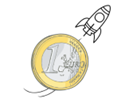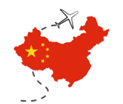TEAM Talks
The financial world is always shifting, with new developments influencing markets and economies. Here’s our take on some of this week’s noteworthy financial news.
 Trump wants lower rates and continues to put pressure on Fed Chair Jerome Powell—calling him “Mr. Too Late” and has even threaten to sack him. Meanwhile, Powell has remained steadfast in his ‘wait and see’ approach, acknowledging that trade tariffs pose risks not only to growth but also to inflation. According to some surveys—where respondents often reflect emotional or politically influenced views—inflation expectations have spiked to their highest level since 1987. However, these expectations have often been proven wrong and central bankers would be unwise to jump to early conclusions.
Trump wants lower rates and continues to put pressure on Fed Chair Jerome Powell—calling him “Mr. Too Late” and has even threaten to sack him. Meanwhile, Powell has remained steadfast in his ‘wait and see’ approach, acknowledging that trade tariffs pose risks not only to growth but also to inflation. According to some surveys—where respondents often reflect emotional or politically influenced views—inflation expectations have spiked to their highest level since 1987. However, these expectations have often been proven wrong and central bankers would be unwise to jump to early conclusions.
 Meanwhile, Christine Lagarde struck a more urgent tone—cutting Eurozone interest rates to 2.25%, with two more reductions expected by September. These are often described as “insurance cuts”, aimed at easing financial conditions just in case the fallout from tariffs worsens. This approach makes sense in the context of a strong euro, which has reached a three-year high against the dollar. When your currency is strong, inflation becomes less of a concern—and governments can spend and borrow more without being penalised for it.
Meanwhile, Christine Lagarde struck a more urgent tone—cutting Eurozone interest rates to 2.25%, with two more reductions expected by September. These are often described as “insurance cuts”, aimed at easing financial conditions just in case the fallout from tariffs worsens. This approach makes sense in the context of a strong euro, which has reached a three-year high against the dollar. When your currency is strong, inflation becomes less of a concern—and governments can spend and borrow more without being penalised for it.
 Chinese President Xi Jinping goes on tour across Southeast Asia to gather allies. While Trump claims the ball is in China’s court to “make him an offer”, the second-largest economy is nowhere near backing down under Trump’s negotiating pressure. In fact, Chinese authorities appear to be using this moment to strengthen ties with other trading partners. That said, replacing the buying power of the US consumer will be no easy task.
Chinese President Xi Jinping goes on tour across Southeast Asia to gather allies. While Trump claims the ball is in China’s court to “make him an offer”, the second-largest economy is nowhere near backing down under Trump’s negotiating pressure. In fact, Chinese authorities appear to be using this moment to strengthen ties with other trading partners. That said, replacing the buying power of the US consumer will be no easy task.
 New export licensing requirements hit Nvidia and other chip equipment makers. These products rely on thousands of components, making it nearly impossible to quickly adapt to tariffs. The new restrictions added to negative market sentiment, as they could lead to lost revenue from overseas buyers, supply chain disruptions, and higher compliance costs. Exports of advanced chipmaking tools to China were already restricted under Biden, and China is well underway in building its own domestic chip equipment industry.
New export licensing requirements hit Nvidia and other chip equipment makers. These products rely on thousands of components, making it nearly impossible to quickly adapt to tariffs. The new restrictions added to negative market sentiment, as they could lead to lost revenue from overseas buyers, supply chain disruptions, and higher compliance costs. Exports of advanced chipmaking tools to China were already restricted under Biden, and China is well underway in building its own domestic chip equipment industry.
 The de-dollarisation of the global economy—where the US dollar loses its status as the world’s reserve currency—has become a popular talking point. A lot would need to change for this to materialise, but the recent divergence between US and European yields has caught people’s attention. The US government’s intention to raise revenue through tariffs while simultaneously cutting spending should, in theory, be rewarded with lower borrowing costs—but that hasn’t been the case so far. Instead, it's the Eurozone that, despite preparing for a fiscal boom, is enjoying more favourable financing conditions. Some have even speculated that China could weaponise its vast holdings of US debt by dumping large amounts into the market—though there is no evidence of that so far.
The de-dollarisation of the global economy—where the US dollar loses its status as the world’s reserve currency—has become a popular talking point. A lot would need to change for this to materialise, but the recent divergence between US and European yields has caught people’s attention. The US government’s intention to raise revenue through tariffs while simultaneously cutting spending should, in theory, be rewarded with lower borrowing costs—but that hasn’t been the case so far. Instead, it's the Eurozone that, despite preparing for a fiscal boom, is enjoying more favourable financing conditions. Some have even speculated that China could weaponise its vast holdings of US debt by dumping large amounts into the market—though there is no evidence of that so far.
